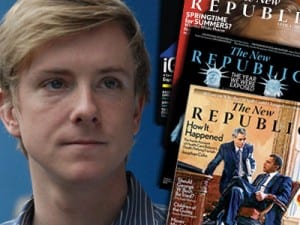 Ketchum welcomed Chris Hughes, the new publisher and editor-in-chief of The New Republic, to our D.C. Media Team’s “Ketchum Conversations” series to discuss his venture to take the storied publication into a new era of journalism.
Ketchum welcomed Chris Hughes, the new publisher and editor-in-chief of The New Republic, to our D.C. Media Team’s “Ketchum Conversations” series to discuss his venture to take the storied publication into a new era of journalism.
The publication will celebrate its 100-year anniversary next year at a time when there are many questions about whether long-form and opinion journalism will survive in this “snacking” era of readers mostly scanning news for fun or attention-grabbing headlines on social media sites like his former employer, Facebook.
Hughes was not just another employee of Facebook, he co-founded the social media empire with Mark Zuckerberg and also was the mastermind behind Barack Obama’s online organization for his 2008 presidential bid. There he created the far-reaching network that revolutionized grassroots political organizing that has become the benchmark for future political campaigns.
And now with those endeavors behind him, Hughes has made the leap to the media industry with his recent purchase of The New Republic and is already making waves. Our conversation largely focused on the evolution of long-form and opinion news writing and how consumers are engaging with the media as journalism evolves.
Hughes took the position that there is still tremendous value today in long-form journalism that encompasses a well-written narrative – and that that type of writing is still sought by readers. And, as the magazine adjusts to the evolving media landscape and audience, Hughes is also taking the organization down the path of offering sponsored content and hosting newsmaker events in a bid to play a bigger role in the policy arena.
While it did not come up during our conversation, Hughes’ purchase of the magazine has not been without controversy. The New Republic leans left politically, and has been under fire by its former publisher Martin Peretz who raised questions about whether it was becoming simply a mouthpiece for the White House. There also has been much made recently about accusations that Hughes bumped a healthcare opus by renowned journalist Steven Brill to run an interview piece with President Obama.
One need only flip through the new pages of The New Republic – or on your mobile device – to see how Hughes and his team are trying a new approach to long-form and opinion journalism. Hughes said that social media sites like Facebook, Twitter and individuals blogs have largely taken over the traditional opinion journalism space and therefore readers are not as willing to pay for that kind of material anymore.
Instead, The New Republic is looking to “focus on quality” long-form journalism that is extensively reported and analytical, building a narrative around an issue, policy or opinion, Hughes said. The publication will not focus on competing with “snacking”, pointing to aggregators and quick-hit news outlets like Huffington Post, Daily Beast or Politico. “That’s not where our niche lies,” he said.
To accomplish his goals, Hughes has brought back as The New Republic’s editor, Frank Foer, who joined him in the presentation to the Ketchum D.C. office. They have nearly doubled the newsroom staff, to 50, and they are looking to try to set the agenda among policymakers. They pointed to a recent piece his team did on the shadowy world of day care in America. The story, entitled “The Hell of American Day Care”, delved into how the industry was largely unregulated and rife with problems. Foer said in the aftermath of the piece, some lawmakers and the Department of Health and Human Services are now asking questions about the industry.
So far, according to Hughes, the statistics are showing that he and his team are making some headway. With the re-launch, subscription numbers are up by 40 percent to nearly 50,000 and with almost 2 million unique visitors to its website, up 145 percent. Hughes also boasted about some high-profile subscribers in the Washington political sphere, but unfortunately we can’t name them here.
With his background at Facebook and on the Obama campaign, Hughes is also bringing some 21st Century technology updates to The New Republic – returning subscribers to where they left off when they transition from one digital device to another to continue reading a story. Additionally, every story is available in audio form, read by a human being, not a computer – ideal for those who can’t read the magazine while on a treadmill or on the trail.
Hughes is also taking The New Republic into a direction many outlets are considering – sponsored content, which is an area that presents challenges to us as media relations specialists and the news media itself. Hughes made the point that good content will get read through sponsored pieces rather than a banner ad. He highlighted a recent sponsored piece by the Bill and Melinda Gates Foundation, which he said received a 4.5 percent click-through rate. Hughes also directly addressed some concerns that have emerged about transparency related to sponsored content. He made it clear that full disclosure is a must, declaring it “can’t be murky.” The New Republic is also hosting events, such as high-level, invite-only conversations with newsmakers from the policy and corporate worlds on key issues of the day such as climate change.
While some may view The New Republic as a political mouthpiece for one side of the political debate, the newsroom staff is tackling broad, significant policy issues that confront public relations specialists and our clients every day. They are also engaging in dialogues where clients want to be, close to those who make policy. It remains to be seen whether Hughes and his team will be successful finding that niche of long-form and opinion journalism, but it definitely is something to watch closely.
Image Credit: www.capitalnewyork.com


